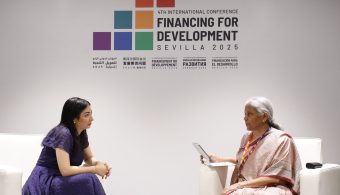Photo Credit: www.bmz.de
On 16 September 2024, Indian Prime Minister Narendra Modi inaugurated a new metro line connecting Ahmedabad to Gandhinagar during the RE-INVEST renewable energy investors conference.
The project, which aims to provide climate-friendly and safe transportation for the region’s nine million residents, was partially financed through a €100 million loan under German development cooperation. The electrification for the metro line was carried out by Siemens, a leading German technology company.
Strengthening Indo-German Cooperation
German Development Minister Svenja Schulze, representing Germany as a partner country at the conference, met with Prime Minister Modi earlier in the day to discuss the significance of the metro line.
Minister Schulze emphasized the importance of environmentally friendly transport solutions in rapidly growing cities like Ahmedabad. “India’s cities are experiencing growth that is almost unparalleled in the world. If these cities focused exclusively on car transport, their congestion and smog problems would quickly become even more unbearable, and the entire world would be faced with even bigger climate problems,” said Schulze.
“So it is great that Ahmedabad is focusing on environmentally friendly metro transport. This example of Indo-German cooperation benefits the environment and the people of India. However, it also benefits Germany, because our prosperity is based on other countries, too, investing in infrastructure and using some German technology in the process,” she added.
Alleviating Congestion and Pollution in Ahmedabad
Ahmedabad, one of India’s fastest-growing cities, faces significant challenges related to traffic congestion and pollution. With many residents commuting to the state capital Gandhinagar, which houses a growing technology hub, the region’s current transport infrastructure has struggled to keep pace. The new metro line is expected to transform daily commutes, initially serving 120,000 passengers per day, with a projected increase to 330,000 over the next 30 years.
Notably, the metro will benefit poorer neighborhoods, where many residents cannot afford private vehicles, and provide a safe transportation option for women. It is also expected to reduce carbon emissions by 50,000 tonnes annually, marking a significant step in India’s green transition.
A Testament to Sustainable Development
The new metro project is a prime example of successful Indo-German collaboration in sustainable infrastructure. Germany’s contribution, through a €100 million loan provided by KfW Development Bank, formed part of the €611 million project.
Schulze noted that this investment, which merges development aid with economic cooperation, benefits both nations. “This support is an investment that pays off – for India, for Germany, and for the world,” Schulze added.



